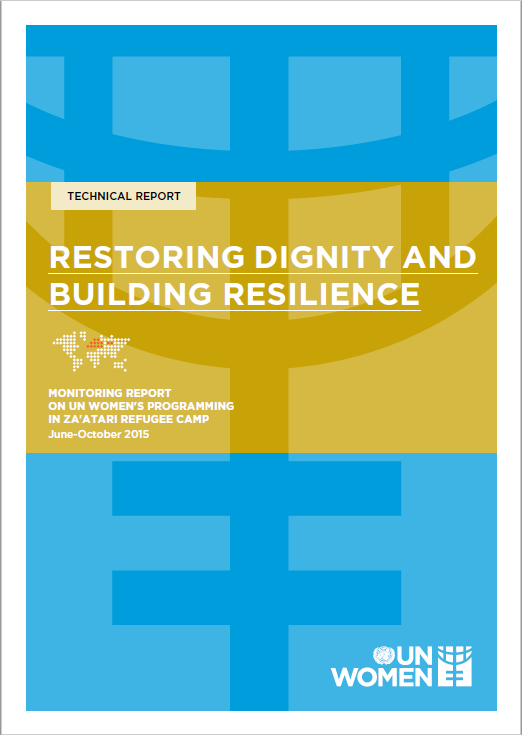
Restoring dignity and building resilience (Technical Report)

UN Women Jordan’s cash for work programme in camp settings, initiated in January 2013, targets the most vulnerable women living in Za’atari camp – soon to expand to Azraq camp, assisting around 1000 people per day through roughly 200 opportunities per day. In the context of shifting from a pure humanitarian response in Jordan to a resilience based response, the programme seeks to restore dignity and normalcy to people by providing them ways to engage their skills and labour in the camp based economy. The programme also combines cash for assistance with the provision of social services such as day care, emergency medical support, life skills and remedial education and civic engagement, to provide a holistic approach to supporting women’s empowerment and gender equality.
The report presented is the findings of programme monitoring undertaken in 2015. It is based on focus group discussions, questionnaire responses and one on one interviews from a representative sample of programme beneficiaries. The data highlights the importance of engaging people productively to build gender equality and combat violence against women, while also enhancing household dietary diversity.
Respondents – both male and female - highlighted economic opportunities as the key priority for international support. The report notes, using inter-agency data, that currently there are roughly 6400 cash for work opportunities available per day in camp settings, of which women receive 24%. The majority of women interviewed - 75% - state a preference for working outside the home, debunking the idea that women in camp settings prefer employment opportunities based in the home.
Isolation and boredom are highlighted as key challenges facing women and girls in Za’atari camp, with access to economic empowerment and public space as instrumental in breaking this isolation. 91% of women interviewed stated that the safe spaces for women help them recover self-esteem and their independent sense of identity. Moreover, engagement in the programme has led to a marked decrease in domestic violence – a reported 20% decrease - amongst the beneficiary population, with the opportunity to leave the home stated as the primary reason for this reduction. Respondents reported feeling increasingly safe though women and girls reported systemic and widespread sexual harassment, hindering their ability to access public space.
70% of the spending of those enrolled in the programme is spent on nutritional diversity - fresh fruit and vegetables, with respondents stating the inability to save any of the money made through the programme. 53% of participants stated that they had engaged in paid work prior to arriving in Za’atari, with 47% being engaged and paid for their labour for the first time.
The findings validate the underlying programme rationale: that increasing women’s engagement in the economy not only results in economic empowerment, but also in social, cultural and political empowerment.